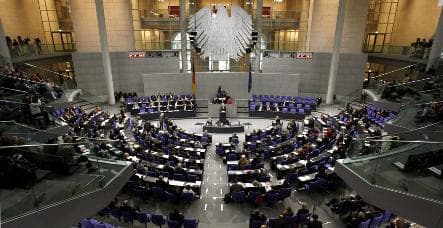Germany passes €480-billion bailout

Germany's €480-billion ($650-billion) bank bailout flew through parliament in an historic fast-track vote on Friday to restore shattered confidence in the crisis-ridden financial sector.
The rescue package, the biggest ever in German post-war history, sailed through the lower house of parliament, or Bundestag, where 476 parliamentarians voted in favour, 99 against and one abstained.
But MPs from all parties made clear the package should not be interpreted as a free pass for the country's beleaguered banking sector.
“We are doing our part to get out of this crisis and expect the financial market players to do theirs,” said Volker Kauder, head of the parliamentary group of the conservative Christian Democrats.
It was then unanimously passed in the early afternoon in the upper house, or Bundesrat, which represents Germany's 16 federal states. There had been however been some grumbling from regional premiers earlier over the cost of the bailout, since they would have to shoulder 35 percent of the burden.
The plan, unveiled at the beginning of the week, includes up to €80 billion in fresh capital for banks and €400 billion in guarantees in order to jumpstart stalled lending between banks.
The package will now be signed by President Horst Köhler later Friday so that it can come into effect on Monday. In the lower house, the ruling conservative CDU/CSU and the Social Democrat SPD parties both voted in favour, as did the liberal FDP. The Greens and the far-left Die Linke party voted against.
Economy Minister Michael Glos said the move was crucial not just for the banks, but primarily for "the good of citizens and the economy."
"Everything must be done to restore confidence" in the financial sector, Glos said.
But Green parliamentary chief Renate Künast branded the proposals as a blank cheque for banks, who could still not be held responsible to taxpayers. Berlin has been at pains to reject such charges, stressing that, in return for aid, the state will take stakes in the banks and demand influence in company decisions, the payment of dividends and even bankers' salaries.
So far, no bank has signalled its intention to apply for aid under the rescue package.
A financial source told AFP that Germany's biggest bank, Deutsche Bank, would not seek state aid.
"Deutsche Bank's capital structure is very strong, as a result there is no need to seek state aid," the source said.
Comments
See Also
The rescue package, the biggest ever in German post-war history, sailed through the lower house of parliament, or Bundestag, where 476 parliamentarians voted in favour, 99 against and one abstained.
But MPs from all parties made clear the package should not be interpreted as a free pass for the country's beleaguered banking sector.
“We are doing our part to get out of this crisis and expect the financial market players to do theirs,” said Volker Kauder, head of the parliamentary group of the conservative Christian Democrats.
It was then unanimously passed in the early afternoon in the upper house, or Bundesrat, which represents Germany's 16 federal states. There had been however been some grumbling from regional premiers earlier over the cost of the bailout, since they would have to shoulder 35 percent of the burden.
The plan, unveiled at the beginning of the week, includes up to €80 billion in fresh capital for banks and €400 billion in guarantees in order to jumpstart stalled lending between banks.
The package will now be signed by President Horst Köhler later Friday so that it can come into effect on Monday. In the lower house, the ruling conservative CDU/CSU and the Social Democrat SPD parties both voted in favour, as did the liberal FDP. The Greens and the far-left Die Linke party voted against.
Economy Minister Michael Glos said the move was crucial not just for the banks, but primarily for "the good of citizens and the economy."
"Everything must be done to restore confidence" in the financial sector, Glos said.
But Green parliamentary chief Renate Künast branded the proposals as a blank cheque for banks, who could still not be held responsible to taxpayers. Berlin has been at pains to reject such charges, stressing that, in return for aid, the state will take stakes in the banks and demand influence in company decisions, the payment of dividends and even bankers' salaries.
So far, no bank has signalled its intention to apply for aid under the rescue package.
A financial source told AFP that Germany's biggest bank, Deutsche Bank, would not seek state aid.
"Deutsche Bank's capital structure is very strong, as a result there is no need to seek state aid," the source said.
Join the conversation in our comments section below. Share your own views and experience and if you have a question or suggestion for our journalists then email us at [email protected].
Please keep comments civil, constructive and on topic – and make sure to read our terms of use before getting involved.
Please log in here to leave a comment.